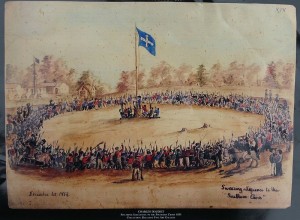The history of Australia shares many key similarities with America – colonialisation, multi-cultural settlement and genocidal atrocities meted out on its indigenous peoples. But colonial Australia, unlike America, was not distinguished by legendary rebellions and revolution. In fact, the event we recall today – the Eureka Stockade or Rebellion of 1854 – was Australia’s first and only armed insurrection against colonial tyranny. Considered the Down Under equivalent of the Boston Tea Party, this relatively small uprising of disgruntled gold miners protesting against crippling taxes enforced by over-zealous police prompted Mark Twain, whilst visiting in 1895, to describe the Eureka Stockade as: “The finest thing in Australia’s history. It was a revolution small in size, but great politically; it was a strike for liberty, a struggle for principle, a stand against injustice and oppression… it is another instance of a victory won by a lost battle.” With no further spirited acts of rebellion to capture the imagination of modern Australians in the 100-years-plus since Twain’s glowing endorsement, Republican lobbyists have revived the Eureka Stockade as the ancestral embodiment of their movement in an effort to bolster national identity, with calls for the insurgents’ Southern Cross flag – famously hand-crafted by the miners’ wives – to replace the well-known Union Jack/Commonwealth Star. The authors of Imagining Australia: Ideas for our Future, assert that Eureka “offers great potential to a nation floundering for a national story.” Indeed, Eureka has been described as the event that heralded the birth of Australian democracy. So let’s take a closer look at this curiously noteworthy rebellion…
When the richest gold field the world had ever known was discovered in 1851 just outside of Melbourne, immigrants poured in from all over the world to seek their fortune; in just three years, the population of the colony of Victoria rose from 80,000 to 300,000. It wasn’t long before the opportunistic British governors doubled the cost of a mining licence, established a gentrified Gold Commission, and introduced heavy-handed licence checks. The incensed miners – many of whom had been involved in militant actions in their homelands – in turn established a Reform League, which quickly escalated into a full-scale revolt. The rebels built a stockade, unfurled their famous flag and took the following oath: “We swear by the Southern Cross to stand truly by each other and to defend our rights and liberties.” On December 3rd 1854, the 40th Military Regiment launched a dawn attack on the ramshackle Eureka Stockade, and crushed the insurgents in minutes – resulting in the deaths of 22 miners and six soldiers.
The rebellion’s spectacular failure might have ended there, had the British not hoisted themselves with their own petard. Thirteen rebel leaders were brought to trial for high treason, but the jury found that the Eureka Stockade had been a riot and not a revolt. And so, under the law, one by one all the defendants were acquitted and the Governor was forced to grant amnesty to all rebels in hiding. Within a year, the hated licence fees were scrapped, miners were given the vote and the colony acquired a democratically elected parliament.
It was a stunning and unlikely political victory, and one that would inspire a genuinely heroic episode in Australian history: the women’s suffrage movement of the 1880s and 1890s.



3 Responses to 3rd December 1854 – The Eureka Stockade